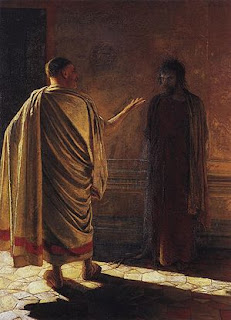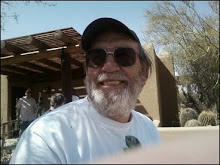Quod est veritas? Christ and Pilate
Nikolai Ge
1890
In John 18:38 of the New Testament in my own King James Bible: "Pilate saith unto him, What is truth?" If there was an answer, it was not recorded or as the text records, Pilate moved on immediately to pronounce his verdict.
The purpose of this conversation (blog), even it is only with myself, is to provide an adequate answer. I will attempt to bring various definitions, theories, and authorities to bear upon the question. It turns out that some authors who write about truth do not even define the term. I have a couple of examples of this that I will present.
We all have a notion of what truth is, but more in terms of what the truth is. According to John 17:17, Christ understood truth in the latter form. Until we are shown otherwise, what we understand to be true is the truth. However sometimes, when we are shown otherwise, what should be false is still the truth. This is the conflict between revealed truth and evidence and is one form of truth invariance. Don't confuse me with facts, my mind is made up.
Another form of truth invariance is the anti-relativist defense, that there is a discoverable, but unitary truth. One set of facts for all of us that is independent of our minds. For those not persuaded by revealed truth, this is the path to the truth. This defense has been with us since Protagoras and Democritus were attacked by the team of Socrates and Plato and followed by Aristotle. Protagoras was deemed a relativist because the only known quotation that is associated with him is: "Man in the measure of all things: of things which are, that they are, and of things which are not, that they are not." Plato makes the argument against this view using Socrates in his dialogue, Theaetetus. Many philosophers have made the same basic argument since then. I will point out a few and comment on them.
Interesting philosophical questions arise in most unusual circumstances and a rock opera is about as unusual as they come: Jesus Christ Superstar. Tim Rice and Andrew Lloyd Webber reworked the original Pilate quote to: "What is truth? Is truth unchanging law? We both have truths; are mine the same as yours?" I have no idea whether those questions are in the opera for artistic reasons or are questions the authors actually had. Regardless, these questions beg for an answer. Those who take the invariance of truth position, the answer is obvious: truth is unchanging (whether it is a law is an unnecessary part of the question). I and a few others take the contrary view; I am a relativist.




1 comment:
OK, Bill, I finally think I have a comment! In order to define truth, you first have to define its opposite. What is untruth? Or what is falsehood? I think it's easier to define A truth or A falsehood, but you're right, THE truth is a little harder.
Post a Comment